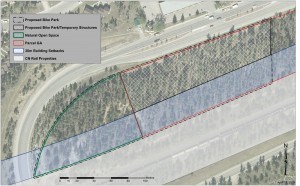
There are very few summer activities as popular as mountain biking in Jasper National Park, yet when it comes to the two-wheeled sport Parks Canada seems passively interested at best.
In recent weeks, the Jasper Park Cycling Association (JPCA) approached Parks Canada’s Planning and Development Advisory Committee to get its blessing to build a mountain bike skills park in the west end of town.
If approved, it would be a huge step for the mountain biking community as well as Parks Canada, which has resisted the growing sport’s aspirations for years.
In fact, in 2012 Parks Canada planned to close large areas of the park to mountain biking as part of its Three Valley Confluence wildlife management plan.
The changes prompted the local riding community to band together, formally establishing the JPCA, which managed to ensure that the most threatened trails were adopted into the official trial network.
Since then, Parks Canada has taken a hands-off approach when it comes to the sport, stepping in only to close or dismantle illegal trails, while relying on the Jasper Trail Alliance and it's own trail crew to improve and rehabilitate a small selection of existing multi-use trails.
In an era when Parks Canada is seeking new ways to engage Canadians approving a mountain bike park is a no-brainer.
Not only will a bike park cater to local riders, it will also likely reduce the number of illegal trails that are built elsewhere in the park.
On top of this, a bike park will attract a new user group supporting local businesses in the process.
You only have to look at the new bike park in Valemount or the well-established park in Hinton to truly appreciate the impact a bike park can have on a local economy.
At a time when Parks Canada is proposing to build a $65.9 million bike trail from Jasper to the Columbia Icefields, you have to wonder why they wouldn’t consider spending a fraction of that amount to support mountain biking.
Take for instance the bike park in Valemount, with $350,000 the Valemount and Area Recreational Development Association has managed to build more than 20 kms of trail in less than two years, turning itself into a biking destination with riders spending the day or even the weekend in the tiny mountain community.
And if that’s not enough to convince Parks Canada, consider the fact that mountain biking is a sport that starts early in the spring and continues late into the fall, a time when local businesses traditionally struggle to make money. Promoting this sport would be a sure fire way to bring in more tourism dollars during the shoulder seasons.
The way we see it, a mountain bike skills park is a win-win-win for Parks Canada, local businesses and the mountain biking community.
